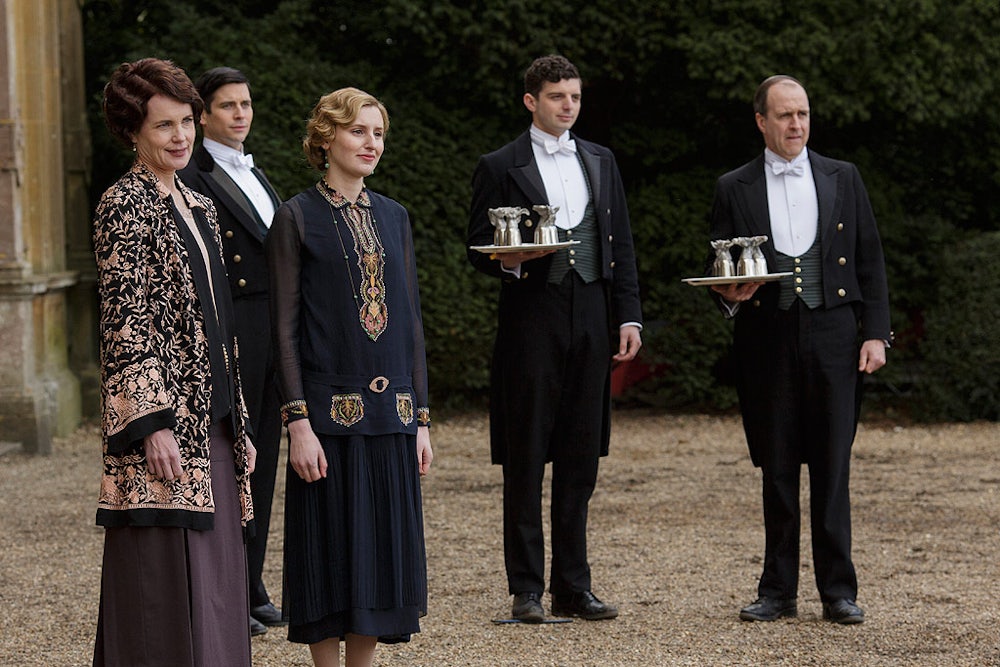Downton Abbey was constructed on a flawed premise: In its desire to celebrate a vanished way of life while heralding the social change that would render it obsolete, the show was trapped in a contradiction. In its last season, Downton wanted desperately to give everyone, upstairs and below, a happy ending without acknowledging that those happy endings are fundamentally opposed. The luckiest servants are the ones who get to leave service—Mr. Moseley becomes a teacher, Mrs. Patmore opens a bed and breakfast, Andy learns to be a pig farmer—but their absence means a deterioration of life for their masters upstairs, the Crawleys, who over thirteen years have pared down the grand ambitions of their privileged lives. We leave the family on the eve of 1926, well aware that on the horizon, history will continue to turn against the Crawleys; the British class system, shaken by the Great War, would be annihilated by the next.
It’s no surprise, given show creator Julian Fellowes’s politics, that he chooses the most traditional way to end Downton; the multiple weddings, implied couplings, and newly arrived babies outdo a Shakespearean comedy. Even Miss Edmunds, Lady Edith’s very modern, very smart magazine editor, gets pushed together with Branson in the final scene. The Downton universe ends as it begins, scheming to marrying off every last character.
All of this is not surprising, though still a little disappointing, for a show that began with an interest in social change. Downton was originally conceived as a three-season show, opening in 1912 at the height of the aristocracy’s pomp and ending in 1925 with its inevitable decline. In its first three seasons the show had plenty of politics to go along with its scandal: Lady Sybil, who dabbles in the suffrage and worker’s rights movements before running off with the chauffeur; Tom Branson, that chauffeur, who fights for Ireland’s independence; Matthew Crawley and Thomas the footman, who meet at the Somme where death is distributed regardless of rank.
But Downton became a victim of its own success. Nominated for 27 Emmys in total, it became the most popular and critically successful British import to American television in history, a crossover hit that appealed not just to Masterpiece Theater diehards but the American public at large. It couldn’t just end after three seasons, though two of its main actors, Dan Stevens (Matthew) and Jessica Brown Findlay (Sybil), left to pursue their careers elsewhere. Downton never quite recovered. It became a much more provincial show, slower, less attuned to the historical currents around it, focused on relationships between characters who often felt like they were in search of a plot to sustain them. In a way, this made Downton feel much more like life, one in which characters’ deaths lingered and drama became more minor. The show’s pleasure came less from its story and more from its presence, a tableau of sighing silk gowns and airy drawing rooms. The crossover hit retreated back into its shell, a mainstay only for anglophiles and period drama enthusiasts.
When the show hit peak popularity in its second season, many critics speculated that its appeal lay partly in Americans’ endless fascination with the British class system. But in rewriting Britain’s vicious class divisions into a fairytale of luxury and noblesse oblige, the show became a missed opportunity. In its very first scene, back in 2011, the housemaids are woken up at six in the morning to open the house before the masters get up. “Just once in my life, I’d like to sleep until I woke up natural,” Anna, the head housemaid, says. That’s as deep as we get in interrogating Edwardian Britain’s largest industry, in which maids carried three tons of water a week, footmen were often stripped of their identities and assigned generic names like William or James, and masters dined on nine-course meals that cost up to six times a housemaid’s annual pay. None of that appears in Downton, where Anna gives birth in Lady Mary’s bed and even Thomas, so long the villain, is given a happy ending as butler.
Still, over the years, Downton has given us some unforgettable moments, especially those delivered by Maggie Smith’s Dowager Countess, who must be at least 100 years old by show’s end. After all, what is a weekend?
